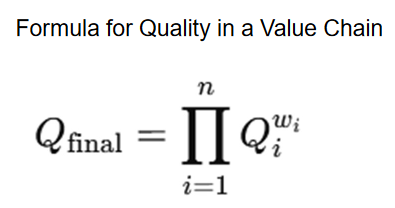Quality function for a value chain

Quality in the value chain is defined as the consistent, reliable and efficient delivery of a final product or service that meets or exceeds customer expectations at every stage.
Each stage of the value chain contributes to the final quality through a multiplicative effect, where the quality at each stage is weighted according to its impact on the overall outcome.
The overall product or service quality is determined by the interaction of quality at each stage, with lower quality in any stage negatively affecting the final product. Qfinal=∏i=1nQiwiQ_{\text{final}} = \prod_{i=1}^{n} Q_i^{w_i}Qfinal=i=1∏nQiwi
Key Components of the quality function
- Definition of Quality: Quality is defined as the ability to meet or exceed customer expectations consistently. This could be based on factors such as reliability, functionality, durability or performance.
- Impact of Each Stage: The value chain is seen as a series of stages, each contributing to the quality of the final output. The quality at each stage plays a role in the cumulative effect on the final product.
- Multiplicative Effect: Acknowledges that the quality of each stage impacts the final output and poor quality in any single stage can reduce the overall quality significantly.
- Weighted Contribution: Reflects the understanding that not all stages contribute equally to the final quality, emphasizing the relative importance of each stage (critical processes or components might weigh more heavily)
The quality function helps ensure that everyone involved in the value chain is aware of the collective responsibility for quality. It clarifies how each part of the process contributes to the end result and sets the foundation for continuous improvement and quality management efforts throughout the entire process value chain.

